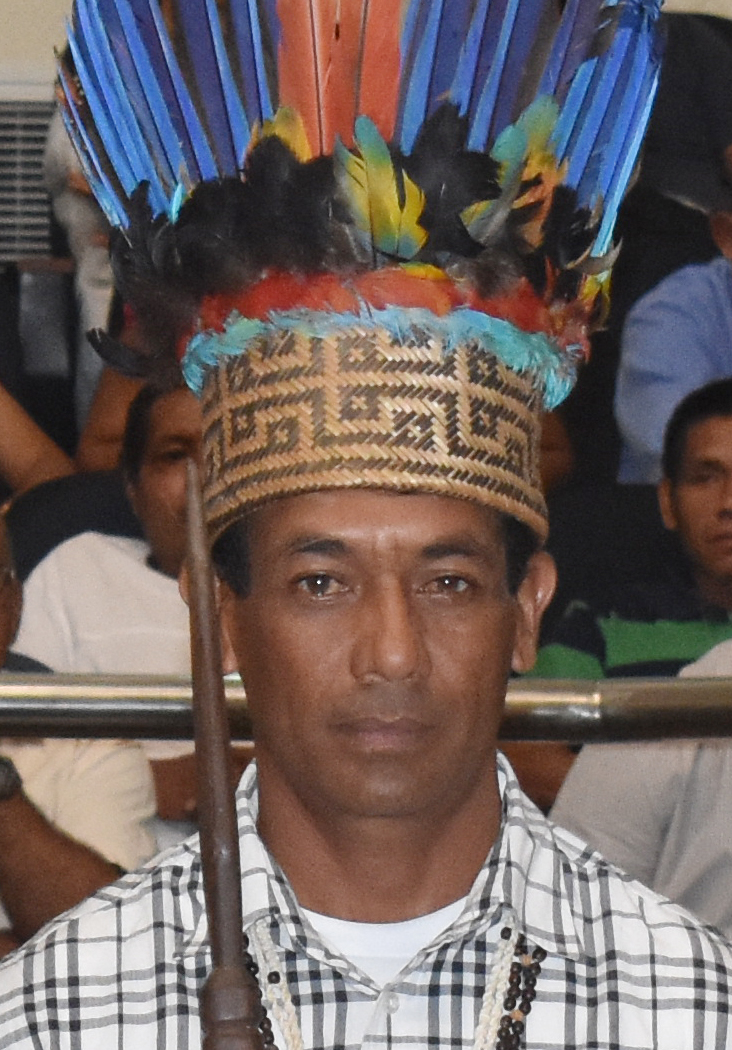Chairman of the National Toshaos Council (NTC) Nicholas Fredericks has recommended that Indigenous communities set up their own security services to ensure law and order in their communities as he believes the Guyana Police Force is incapable of adequately protecting them.
“Toshaos have nothing to defend themselves and we are challenged to secure entire villages. I have nothing to defend myself as a toshao. It is just a matter of knowing when and how to intervene, that is, if you are going to intervene, considering what happened at Kurutuku,” Fredericks told Stabroek News.
Solomon Lewis, the late toshao of Kurutuku, was beheaded on New Year’s Day when he sought to intervene in a domestic dispute between his daughter and his son-in-law, who has since been charged with his murder.
Fredericks said security was recently discussed and recommendations were put forward to the consultants conducting the Ministry of Public Security’s Citizens Security Project, of which the NTC is a stakeholder. The NTC is awaiting further discussions of what could be implemented, he said.
Among the recommendations made are that the toshaos and village councils must have more authority over the affairs of the village, that there should be a reporting and quick response/intervention mechanism in place.
“I could see this security programme being shelved and nothing implemented. How can we as Indigenous Peoples have dialogue with the relevant authorities to make sure that we come up with something concrete that could work for security for Indigenous Peoples?” he questioned.
If Indigenous Peoples could have their own security services, he said, they could better enforce the laws and get justice as they understand the problems arising from cultural issues.
Monitoring roads
One of the things that could be done, he noted, is to empower Indigenous Peoples to monitor the roads. “The roads belong to the state. We have no control over them. That is a big problem. Rustling of cattle, smuggling of gold and equipment and trafficking in people and illicit stuff from Brazil or from mining areas to the city are happening through Indigenous Peoples lands. Any major road that passes through Indigenous Peoples’ places poses a threat. They are not building roads for us. They are building for people to access our areas. If we are not given the authority to monitor these roads, the problem will not change. If we can collaborate with the relevant security forces to have checkpoints at strategic areas, that could change the dynamics. There needs to be more collaboration between the community and the state’s security services,” he said.
Fredericks said one of the things the South Rupununi District Council (SRDC), which he chairs, is doing, is environmental monitoring. The SRDC is the only district council that is gazetted.
“We are monitoring the border where Brazilians come across and smuggling of gold into Brazil. We believe the data we have provided to the police and to the Guyana Defence Force is really important to them. This is the kind of working relationship that we want. We actually got them to intervene and to destroy some of the illegal crossings where miners were bringing in mining stock,” he pointed out.
This could be replicated nationally but villages would have to be better organised, he said.
Because of security issues, he added, he is trying to push for the establishment of villages organising themselves into district councils. “The more unity we have as Indigenous Peoples, it would be easier for us to approach the relevant authorities to address a lot of these issues,” he further noted.
Community policing groups, he said, should be more empowered to execute their mandates. “…They really help the village councils a lot. Most of the villages have community policing groups but they do not have weapons. They can only make reports. Most of the villages do not have telephone communication, so that by the time a report is made and a feedback is given, the accused would have disappeared,” he further observed.
Barrier
In terms of policemen, Fredericks said, “There is a barrier between them and local people. For some reason there is the mentality that they can take advantage of the Indigenous Peoples and for us to access justice, it is very difficult.”
Where police stations are found, he said, “They [policemen] create a lot of problems with the villagers. They would take bribes. They get involved with the young girls in the villages. Sometimes reports are made to them and they do not act on them. They know that the complainants cannot go elsewhere to expose them and they know there is other was of people getting redress.”
If councils are not proactive, Fredericks said, the state’s security system will work against the people instead of providing security. “I have seen this in a lot of villages,” he noted.
With development, more young people are leaving the villages for the towns, he said, while adding that when they return, they do so with a different mentality, and they could pose a threat to the security. “If the toshao or the village council is not vibrant enough, a lot of lawlessness could take place. It is sometimes left for the toshao alone to deal with everything,” he said.
On giving toshaos firearms, he said, “I am not too much in favour of toshaos being armed. The toshao might himself get drunk and start shooting somebody, too. Once you have a gun in your hand and you talking security, you talking about shooting somebody. What is the mentality you are putting into the toshaos’ head if you are going down that road?”
“We cannot fight violence with violence. There needs to be a lot of awareness. People have to know their rights, how to approach people, and how to avoid conflicts and confrontations. It is not just about arming with weapons but having the capacity to talk to people and maybe, from a national level start to discuss how,” he further added.






